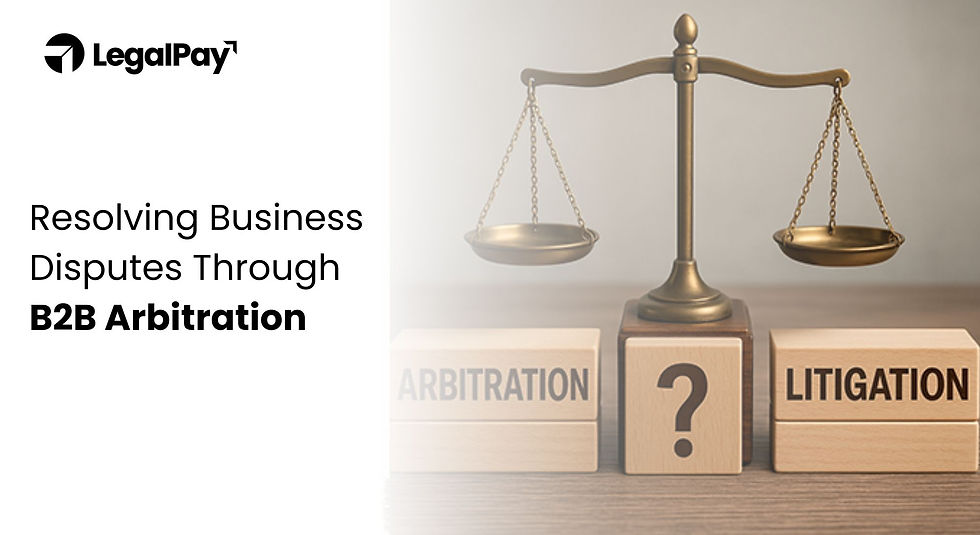Protecting Your Real Estate Investments: Tips for Preventing Ownership Disputes in India
- LegalPay

- Nov 28, 2023
- 4 min read
Navigating the intricacies of Indian real estate laws is paramount for property transactions and ownership, as the legal landscape often involves nuances that can significantly impact individuals and businesses. From understanding the fundamental structures of property ownership to pre-emptively addressing common disputes, lawyers play a pivotal role in safeguarding their clients' interests. This article delves into key facets of Indian real estate laws, providing insights into property ownership structures, the importance of land title verification, and proactive measures to prevent and manage ownership disputes.
Understanding Indian Real Estate Laws
1. Property Ownership Structure
In India, property ownership can be classified into two broad categories: Freehold and Leasehold. Freehold properties grant the owner absolute ownership rights, while leasehold properties provide ownership for a limited time, typically 99 years. Lawyers should advise clients to comprehend these distinctions, as the ownership structure can have significant implications for future disputes.
2. Land Title Verification
A critical step in preventing ownership disputes is to conduct a thorough title search. Lawyers must ensure that clients acquire properties with clear titles and no encumbrances. Title defects can lead to disputes, as subsequent owners may assert claims over the property.
Example: Mr Verma purchased a property without a proper title search, only to discover later that the land had a disputed ownership history. This led to a prolonged legal battle, resulting in substantial financial and emotional stress.
Common Ownership Disputes and How to Prevent Them
1. Boundary Disputes
One of the most common issues in real estate ownership is boundary disputes. These disputes arise when the boundaries of a property are unclear or overlap with neighbouring properties.
Prevention: Lawyers should emphasize the importance of accurately demarcating boundaries during property registration and the significance of conducting a survey. Encourage clients to engage a licensed surveyor to avoid boundary disputes.
2. Fraudulent Transactions
Unscrupulous individuals may engage in fraudulent property transactions, leading to multiple claims on the same property. This can result in protracted legal battles and financial losses.
Prevention: Lawyers should recommend thorough due diligence, including verifying the authenticity of property documents and ensuring compliance with legal requirements. Encourage clients to conduct background checks on sellers and scrutinize the property's history.
Example: Ms Sharma invested in a property only to discover that the seller had forged documents. This led to a legal quagmire that took years to resolve.

3. Incomplete Documentation
Incomplete or unclear property documents can be a breeding ground for disputes. Often, missing or improperly drafted documents can lead to ownership conflicts.
Prevention: Lawyers should insist on complete documentation during property transactions. This includes deeds, agreements, and mutation records. Clients should be advised to maintain meticulous records of all property-related paperwork.
4. Non-compliance with Local Laws
Failure to adhere to local zoning and land-use regulations can result in disputes with local authorities, neighbouring property owners, or environmental agencies.
Prevention: Lawyers should guide clients in complying with all local regulations and zoning laws. This includes obtaining necessary permits and ensuring that the property's intended use is in accordance with the law.
Example: Mr. Raj was embroiled in a legal battle with municipal authorities due to unauthorized construction on his property. Non-compliance with local laws led to substantial fines and legal fees.
5. Co-Ownership Disputes
Co-ownership arrangements can be particularly prone to disputes, especially when one party wants to sell or partition the property.
Prevention: Lawyers should draft clear co-ownership agreements that outline the rights and responsibilities of each party. Encourage clients to seek mediation or alternative dispute resolution methods in case of disagreements.
6. Inheritance and Succession Issues
In cases of inherited properties, the lack of a valid will or disputes among legal heirs can lead to complex ownership issues.
Prevention: Lawyers should stress the importance of creating a will to clearly specify the distribution of the property. Clients should be educated about the laws of succession in India and encouraged to resolve inheritance matters amicably through mediation or legal channels.
Example: The Singh family faced a prolonged legal battle over the distribution of property left behind by their deceased patriarch due to the absence of a will.
Conclusion
In the labyrinth of Indian real estate, where legal intricacies can shape the destiny of property transactions, this exploration has underscored the pivotal role of lawyers in navigating the complexities. From the foundational structures of property ownership to preemptive measures against common disputes, legal guidance emerges as the beacon for safeguarding the interests of individuals and businesses alike.
The delineation of Indian real estate laws, encapsulated in the distinctions between Freehold and Leasehold properties, serves as a compass for clients steering through the landscape of ownership. The cautionary tale of Mr. Verma serves as a stark reminder of the repercussions of neglecting the essential step of a thorough title search, emphasizing the critical need for due diligence in acquiring properties.
The identified common ownership disputes, ranging from boundary issues to fraudulent transactions, incomplete documentation, non-compliance with local laws, co-ownership conflicts, and inheritance challenges, shed light on the multifaceted nature of potential pitfalls. Each preventative measure proposed – accurate boundary demarcation, due diligence, meticulous documentation, adherence to local laws, clear co-ownership agreements, and the creation of wills – acts as a shield against the legal quagmires that could otherwise ensue.
In conclusion, lawyers stand as guardians of a seamless real estate journey, guiding clients through the intricacies and mitigating risks at every turn. By embracing the insights shared in this exploration, individuals and businesses can fortify their positions, ensuring that the tapestry of ownership remains untangled and secure. As we part ways with this exploration, let us recognize the empowering potential of legal counsel in shaping a robust and resilient real estate landscape for all.




Comments